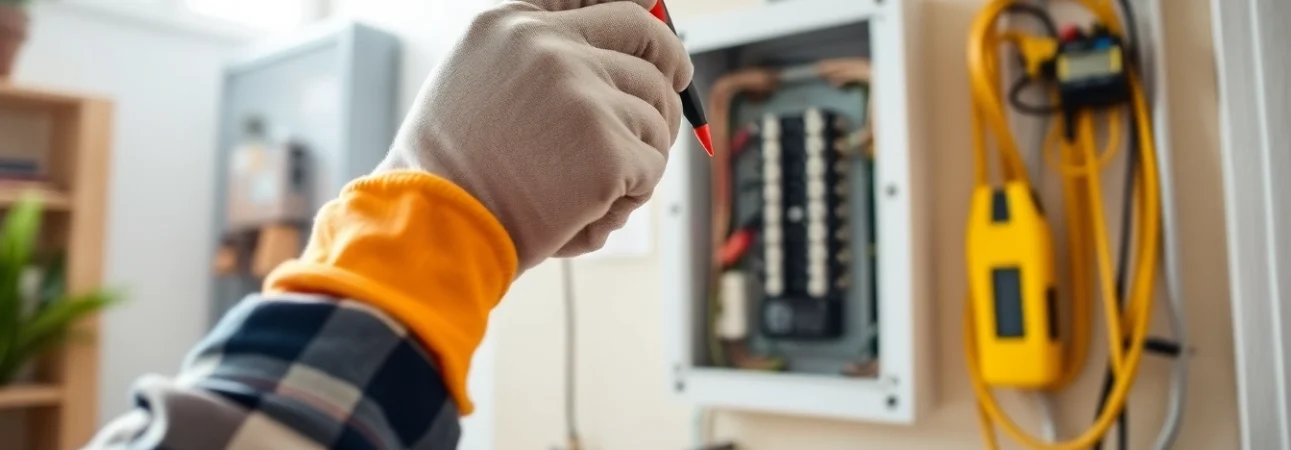What is an Electrical Panel Upgrade?
Definition and Importance
An electrical panel upgrade involves replacing or enhancing the existing electrical service panel in a home to accommodate increased electrical loads and improve safety. This upgrade is crucial for homeowners looking to modernize their electrical systems, especially as appliances become more power-hungry and households incorporate more technology. An outdated electrical panel can lead to numerous issues, including inadequate power supply, frequent circuit breaker trips, and potential fire hazards. Understanding the significance of an Electrical Panel Upgrade helps homeowners make informed decisions regarding their electrical needs.
Key Components of an Electrical Panel
The electrical panel serves as the main hub for the electrical system in a home. Key components include the following:
- Main Breaker: This safety shutoff allows homeowners to cut all electricity to the house when necessary.
- Circuit Breakers: These devices protect the electrical circuits from damage caused by overloads; they automatically shut off the flow of electricity to prevent fires.
- Bus Bars: These metal bars distribute electricity from the incoming service line to various circuit breakers.
- Grounding System: A critical safety feature that directs excess electricity to the ground, reducing the risk of shocks and electrical fires.
Differences Between Electrical Panels
Electrical panels vary significantly based on their capacity, design, and age. Common types include:
- 100-Amp Panels: Typically found in older homes, these panels may no longer meet the demands of modern electricity use.
- 200-Amp Panels: The standard for most modern homes, providing ample capacity for high-demand appliances and fixtures.
- Subpanels: Used to distribute power to specific areas of the home, such as garages or basements, aiding in efficient power management.
Signs You Need an Electrical Panel Upgrade
Outdated Electrical Systems
Older homes, particularly those built several decades ago, may be equipped with outdated electrical systems that cannot support modern electrical demands. As technology advances and appliances grow more power-intensive, an outdated panel may struggle to supply adequate electricity, necessitating an upgrade.
Frequent Circuit Breaker Trips
If circuit breakers regularly trip, this is a clear indication that the electrical panel is overwhelmed. Tripped breakers signal that the circuits are drawing too much power, which can lead to overheating and potential fire hazards. Homeowners should consider upgrading their electrical panel if they frequently experience this issue.
Planning for Future Electrical Needs
Planning for future electrical demands is critical for any homeowner. If you’re considering adding significant electrical loads such as electric vehicle chargers, home automation systems, or additional appliances, an upgrade may be necessary to ensure that your electrical system can handle the increased demand efficiently and safely.
The Benefits of an Electrical Panel Upgrade
Increased Safety and Compliance
One of the primary advantages of upgrading an electrical panel is enhanced safety. Modern panels are built with advanced technology designed to minimize risks such as electrical fires or shocks. In many jurisdictions, electrical codes have evolved, and upgrading can help ensure that your home complies with current safety regulations.
Enhanced Electrical Capacity
Upgrading your electrical panel to a higher amperage, such as 200 amps, allows for increased capacity to handle more circuits and appliances. This enhancement not only supports current electrical needs but also prepares the home for future expansions or enhancements in electrical technology.
Long-Term Cost Savings
Although the upfront cost of an electrical panel upgrade can be significant, it often yields long-term savings. A modern panel operates more efficiently, potentially reducing energy costs. Furthermore, preventing potential electrical issues can save homeowners from costly repairs, ensuring the electrical system remains reliable and effective.
Factors Affecting the Cost of an Electrical Panel Upgrade
Panel Type and Size
The type and size of the electrical panel significantly influence the overall cost of an upgrade. Standard 200-amp panels will generally cost more than 100-amp panels due to their enhanced features and capabilities. Additionally, customized panels that provide customized solutions can also lead to higher costs.
Labor Costs
The labor involved in upgrading an electrical panel can vary based on location, the complexity of the installation, and the electrician’s experience. Costs typically range from $50 to $120 per hour. It is advisable to engage a licensed electrician to ensure the work meets all safety and compliance standards.
Permits and Additional Upgrades
Many areas require permits for electrical work, which can add to the overall cost. Furthermore, if the upgrade involves additional changes, such as rewiring circuits or upgrading grounding systems, those expenses must also be factored into the budget.
Steps to Successfully Complete Your Electrical Panel Upgrade
Consult with a Licensed Electrician
The first step in the upgrade process is consulting with a licensed electrician. They can assess your current electrical system, discuss your future electrical needs, and recommend the best course of action. Their expertise ensures that the upgrade is safe, efficient, and compliant with local codes.
Understanding the Permit Process
Before beginning any work, it is essential to understand the permit requirements in your area. Permits are crucial for ensuring that all electrical work is conducted according to local codes and regulations. Your electrician can guide you through this process, including applying for the necessary permits.
Post-Upgrade Maintenance and Safety Checks
After completing the panel upgrade, ongoing maintenance and safety checks are vital. Regular inspections help identify potential issues before they become serious problems. Homeowners should remain vigilant about circuit function and scheduling periodic assessments with an electrician to ensure everything operates safely and efficiently.
